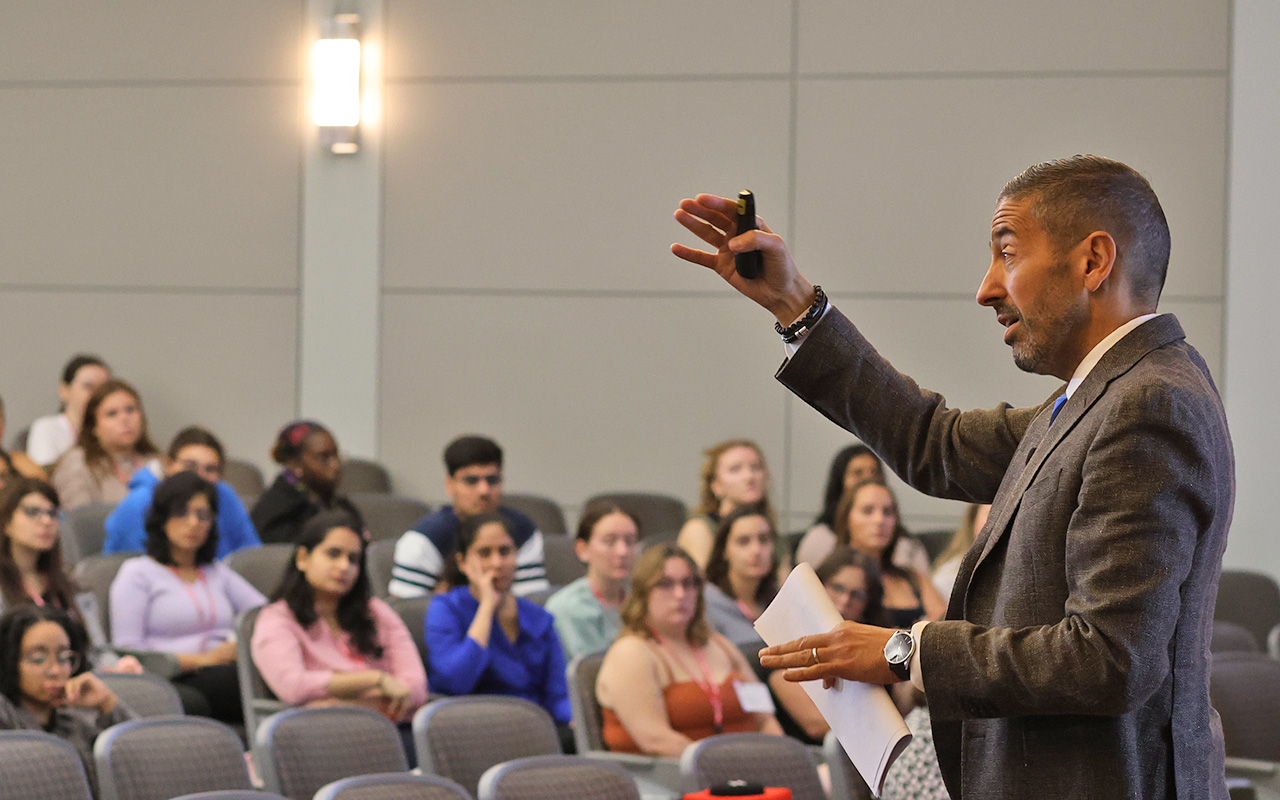Design a program of study that aligns with your academic and professional goals
Including 400-hours of mentored research, BU’s MS in Population Health Research is a STEM-approved, 34-credit program that will prepare you for research positions in academic settings, government, hospitals, private industries, or to pursue doctoral education in related fields and disciplines.

Featured Story
SPH Launches Population Health Data Science Program
The cross-disciplinary program fosters innovative research collaborations, trainings, industry partnerships, and more among faculty, staff, and students across the school and university.
Curriculum
The Master of Science (MS) in Population Health Research degree establishes a foundation in the theory and practice of public health research while offering the opportunity to specialize in a unique area of interest. Population Health Research students develop knowledge in quantitative and qualitative research methods, receive comprehensive training in analytical methods for decision-making, and gain practical experience in their real-world application.
The MS program also equips students with specific skills and training in hypothesis development, data collection and management, statistical computing techniques, and appropriate interpretation and presentation of research results.
MS in Population Health Research Program Structure
The Population Health Research program encourages students to harness the power of data and transform it into knowledge that informs solutions to promote and protect health. Students work closely with our expert faculty members to design a program of study that aligns with their academic and professional goals.
The Population Health Research curriculum blends real-world experience, faculty-mentored research, and the opportunity to build a professional network in Boston and beyond.
Through the School of Public Health’s MS in Population Health Research, students are able to:
- Critically evaluate research reports and publications.
- Design data collection and management plans.
- Analyze and synthesize research findings to inform evidence-based policies or recommendations.
- Develop a scientific hypothesis and design a research study to test the hypothesis.
- Communicate research results in technical and non-technical terms to potential stakeholders.
Boston University also offers STEM-approved Master of Science degrees in Climate and Health, Epidemiology, Global Health Research, Public Health Data Science, and Translation and Implementation Science.
Flexible Options for Full- or Part-Time Study
Designed to fit seamlessly within the scheduling needs of students, the MS in Population Health Research is designed for either full- or part-time study with the opportunity to complete a portion of the coursework online. This structure supports the achievement of academic and professional goals while maintaining a balance between work, education, and home life.
View the BU Bulletin for course requirements
Full-time Schedule:
Taken full-time, the MS in Population Health degree can be completed in as little as 12 months. All students (full and part time) will begin the program in July and must complete Essentials of Population Health Research and Accelerated Training in Statistical Computing first.
Part-time Schedule:
The MS in Population Health Research can also be taken through part-time study of one or two courses per semester with an average program completion of 24 months. All students (full and part time) will begin the program in July and must complete Essentials of Population Health Research and Accelerated Training in Statistical Computing first. Contact the program director, Andrew C. Stokes, PhD, for more information on part-time scheduling.
Specializations
Faculty Spotlight
Andrew C. Stokes, PhD—Assistant Professor, Global Health
Andrew Stokes' work is focused on investigating the causes and consequences of the growing global burden of non-communicable diseases and identifying effective approaches to reducing this burden through health systems strengthening and regulatory measures. Read more.
Outcomes
Population Health Career Outlook
Working on the front lines of some of the most pressing human health crises of our time, public health researchers are diving deeper to understand the causes and solutions to these urgent challenges. This includes current issues such as confronting the opioid crisis, dealing with the growing threat of resistant bacteria, and monitoring the effects of climate change on public health.
Graduates are prepared to continue on to doctoral study or to start a successful public health research career in academic settings, government, hospitals, or private industries, in the following in-demand roles:
- Research Associate
- Clinical Research Specialist
- Health Outcomes Research Analyst
- Study Design and Analytics Specialist
- Research Consultant
Imagine your future career by exploring where Boston University School of Public Health students are employed after graduation.
Admissions
MS in Population Health ResearchAdmission Requirements
To be admitted into this MS program, students must hold a bachelor’s degree from a recognized institution or be on track to complete one prior to enrollment. Students are not required to submit GRE test scores as part of their application.
Begin Your Research Career in the School of Public Health
Create your own fulfilling research career with the MS in Population Health Research degree.
Contact the School of Public Health Admissions Office at asksph@bu.edu or 617-358-4095 to schedule a visit or learn more about admission eligibility, degree requirements, deadlines, and application information. You can also request more information about Boston University’s MS in Population Health Research.

